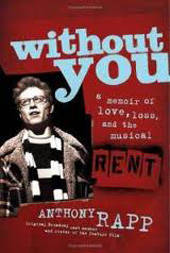Without You
M usical - book and lyrics by Anthony Rapp, based on his bestseller Without You: A Memoir of Love, Loss, and the Musical Rent; music by John Keaney, David Matos, Joe Pisapia, and Anthony Rapp; featuring songs from Rent, music and lyrics by Jonathan Larson
usical - book and lyrics by Anthony Rapp, based on his bestseller Without You: A Memoir of Love, Loss, and the Musical Rent; music by John Keaney, David Matos, Joe Pisapia, and Anthony Rapp; featuring songs from Rent, music and lyrics by Jonathan Larson
TBG Theater, 312 West 36 Street,New York - September 27 - October 9
Menier Chocolate Factory, London - 5 Sep - 15 Sep, 2012
Synopsis
You would need a heart of stone to resist being moved by Anthony Rapp’s one-man musical memoir of love and loss. But you would not need to be a fully paid-up cynic to feel, uncomfortably, that what in essence you are witnessing here is an auto-therapy session in the guise of a solo concert.
In 1994, Rapp landed the role of Mark the film-maker in Rent, the rock musical, loosely modelled on La Bohème, which dramatised, in a spirit of defiance, the devastating effect of AIDS on New York’s artistic community.
Famously, its composer Jonathan Larson died of an aortic aneurysm on the night before the show’s 1996 off- Broadway opening. The rest is theatrical history. The tragic self-reflexive dimension the piece had thus acquired was compounded for Rapp by the fact that as the downtown musical blossomed into a full-blown phenomenon, his mother’s life was being eaten away by cancer.
Backed by a powerful five-piece band, the fadedly boyish Rapp belts out a mix of numbers from Rent and by REM , plus a few new songs he has co-authored, such as the banal, lachrymose “ Visits to You” and the more pointed and angry “Wild Bill” (which was his mother’s nickname for her tumour).
He charts the developments in his relationship with his dying parent (her belated acceptance, say, of his homosexuality), “The only way out is through.” And his resuscitation of his beloved mother (whose frail, sweet-natured voice he impersonates) seems to be claustrophobically confined to how he felt about her during her illness.
We learn more about the admiring baby book she kept about him than we do about any independent existence she might have enjoyed. The contrast would be with Rufus Wainwright whose grief for his mother Kate McGarrigle has been transmuted into an art profounder than self-help book catharsis in songs such as “Zebulon” and the last verse of “Montauk”.